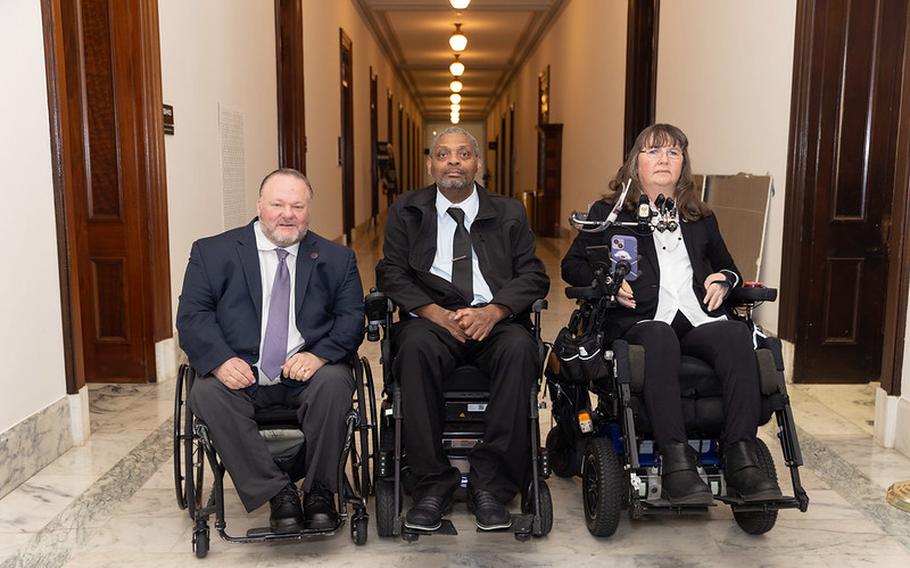
Anne Robinson, national vice president of Paralyzed Veterans of America, sits with Robert Thomas, center, the group’s president, and Tom Wheaton, the group’s national treasurer, outside Senate chambers in March 2025. Members of the nonprofit organization met with lawmakers to present their legislative priorities. (Keith Mellnick, Paralyzed Veterans of America)
WASHINGTON — Check-in counters for appointments at Department of Veterans Affairs medical buildings often are too high and out of reach for people in wheelchairs.
Inadequate curbside parking for vans with mechanical lifts makes it difficult for veterans in wheelchairs to enter some VA clinics and hospitals. Exam tables many times cannot be adjusted to handle the transfer of paralyzed patients.
That is the message from veterans advocacy groups urging lawmakers to adopt legislation for reviewing disability accommodations at the VA and make recommendations for improvements.
Bills under consideration in the House and Senate would form a 15-member committee to address complaints by veterans’ advocates about barriers to care for the most physically vulnerable patients — veterans incapacitated by catastrophic injuries and illness.
The Veterans Accessibility Act is being led by Sen. Rick Scott, R-Fla., in the Senate. Rep. David Valadao, R-Calif., has introduced a companion bill in the House titled the Veterans Accessibility Advisory Committee Act.
The committee created by the legislation would be responsible for evaluating and reporting on the VA’s compliance with federal disability laws, the lawmakers said. More so, veterans with disabilities and their advocates would be included on the committee to share firsthand information and insights about persistent problems to accessing VA care and services.
“Using the VA has been tremendous for me, but it is not always as accessible as it could be,” said Army veteran Anne Robinson, 55, of Texas, national vice president of Paralyzed Veterans of America. The nonprofit estimates there are roughly 42,000 veterans living with spinal cord injuries or disease.
“Whether an appointment room is large enough to fit my wheelchair — or even the size of an exam table itself — can determine whether I get the medical care I need,” said Robinson, who was paralyzed from the chest down while on a military training exercise 25 years ago. She was 29 years old at the time.
Congress passed the Americans with Disabilities Act and the Rehabilitation Act of 1973 to protect patients with disabilities in health care settings. The laws ensure access to services and prohibit discrimination based on disability.
Though federal law requires equal access to health services for people with disabilities, VA has struggled to provide fully accessible facilities, said Heather Ansley, chief policy officer at Paralyzed Veterans of America.
Doors to some VA facilities do not automatically open, wheelchairs don’t fit in the restrooms, and ramps are missing from offices and facilities, advocates said.
The committee also would look at the functionality and performance of VA websites for disabled veterans who use adaptive technologies such as voice control to send communications and receive information.
Scott said the VA has failed to make its websites, kiosks and other technology consistently accessible for people with disabilities, as required by law.
“It is unthinkable that federal programs intended to support our veterans would be inaccessible to so many who live with disabilities and rely on these essential services,” he said.
The legislation is endorsed by several veterans groups, including Disabled American Veterans, Paralyzed Veterans of America, Wounded Warrior Project and Iraq and Afghanistan Veterans.
“We strongly support this legislation because accessibility improvements must be informed by the experiences of those directly impacted — veterans who rely on VA health care and services every day,” said Daniel Contreras, national commander of Disabled American Veterans.
Jose Ramos, a combat-wounded Navy veteran who served in Iraq and Afghanistan, said having a voice on a VA advisory committee is critical for post-9/11 veterans disabled by combat wounds and service-connected illnesses.
Ramos, who leads government and community relations at Wounded Warrior Project, said many post-911 disabled veterans rely on the VA for their health care and disability compensation.
“These veterans interact with the system the most and have detailed and personal knowledge of accessibility challenges at VA facilities and online,” he said.
The legislation has the support of Sen. Jerry Moran, R-Kan., chairman of the Senate Veterans’ Affairs Committee, and Sen. Richard Blumenthal of Connecticut, the top Democrat on the committee.
Moran said he sees the legislation as making certain that the VA complies with federal accessibility laws no matter where the clinic or hospital is located.
“In Kansas, and particularly in rural areas, veterans with disabilities face challenges accessing the facilities and services provided by the VA,” he said.
Similar bills were introduced in the House and Senate in 2023 but did not advance to a final vote.
Robinson, a former sergeant, said she has been receiving VA care and services since she was medically retired from the Army in 2000. She suffered life-threatening injuries after the military truck that she was travelling in crashed while on an icy highway in Alaska.
Robinson has focused on advocating for paralyzed veterans since her military service ended.
“VA is the only place I can go for anything medical,” she said.
Robinson also said the VA offers highly specialized care and resources not readily available for paralyzed veterans in the community.
“My hope is that this legislation will make things better for veterans with complex medical needs,” she said. “Paralyzed Veterans of America has been working with the VA for so long to ensure greater accessibility. But VA buildings are mostly old. Even when they retrofit, it does not always work out for the best.”